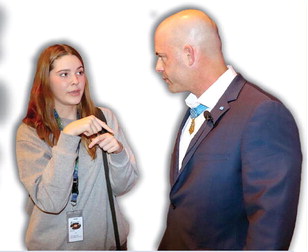Things have changed a bit since Matt Williams last walked the halls of Boerne High School: BHS is no longer the city’s only high school; its sports teams now compete for state championships on a regular basis; and a Congressional Medal of Honor now hangs around Williams’ neck.
Williams, a Class of 2000 Boerne High grad, returned to BHS Oct. 1 and spoke to students as part of the Congressional Medal of Honor Society Conference and Celebration being held Sept. 29-Oct. 5 in San Antonio.
As a young boy, Williams’ family moved to Boerne from the Houston area. His father, he said, “decided to teach me about hard work, integrity, resilience, accountability ... and some of the values I still live with today.”
After graduation he went to college to pursue a career in criminal justice, with a goal of landing a job in law enforcement.
“I’ve always been driven to serve. I knew it was something very important to me,” Williams said. “There’s no better way to be appreciative of a free democratic society than to serve it.
“My generation’s world changed drastically on Sept. 11, 2001,” he told the assembled students. “I remember waking up in our dorm, turning on the news, and seeing both (World Trade Center) towers in New York City on fire.”
He said he knew there was an opportunity to give back and, in 2005, enlisted in the U.S. Army Special Forces, a.k.a., Green Berets. “I decided that was the way I was going to serve.”
On April 6, 2008, while serving as a weapons sergeant in the Nuristan Province of Afghanistan, “we were charged with going after a high-value target in the mountains of Eastern Afghanistan,” he said.

“About halfway up the mountain, the whole entire place just exploded.”
Unknown to Williams and his detachment, about 200 Taliban soldiers were there, lying in wait.
According to Williams’ Medal of Honor documentation, the lead portion of the assault element sustained several casualties and became pinned down on the mountainside.
Sgt. Williams “braved intense enemy fire to lead a counter-attack across a valley of ice-covered boulders and a fast-moving, ice cold, and waist-deep river,” the document states.
“Under withering fire, Williams and his commandos fought up the terraced mountainside to the besieged element.”
They returned fire, preventing the insurgent fighters from overrunning the position. Williams braved enemy fire once again to move a wounded team sergeant down the sheer mountainside to the casualty collection point, then fought his way back up the mountainside to help defend the lead assault element.
Williams directed suppressive fire and exposed himself to enemy fire, in order to reestablish the team’s critical satellite radio communications, then assisted with moving the wounded down the near-vertical mountainside to the casualty collection point. He then led the commandos in a counter-attack that lasted for several hours.
Williams’ “complete disregard for his own safety” and his concern for the safety of his teammates, ensured the survival of four critically wounded soldiers and prevented the lead element of the assault force from being overrun by the enemy.
These actions resulted in Williams later being nominated in 2018 to receive the Congressional Medal of Honor, a distinction he received on Oct. 30, 2019, from President Donald Trump in a ceremony at The White House.
He laughingly recalled the story of receiving “the phone call” from the White House.
“The phone rings and, it was just like in the movies, I’ll never forget it. A voice comes on and says, ‘Please hold for the president.’ I was shocked,” he said.






Comment
Comments